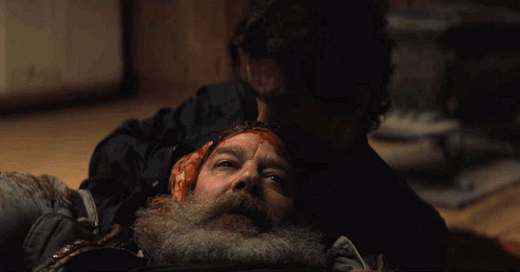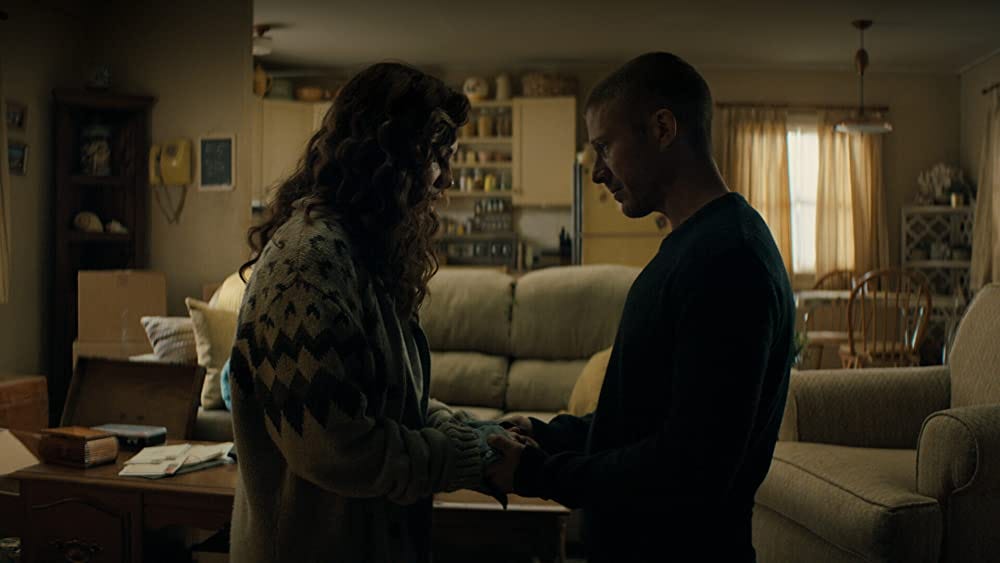Episode 4 of Midnight Mass is Mike Flanagan’s hour-plus meditation on addiction. A recovering addict himself, Midnight Mass’ storyteller begins, from the first scene of episode one to wrestle with the cost of addiction. When Riley kills a girl, we all get that. No one escapes the cost of other people — oftentimes people we love — and their addiction to substances. That being the case, two schools of thought have emerged over the years. The first sees addiction as a disease. Like cancer or Covid, it’s something you get, catch or otherwise have to deal with. The second school of thought is that addiction can’t be a disease, because it’s participation in a particular behavior that begets the addiction. For instance, no one ever gets addicted to cocaine if they never take cocaine. Hidden beneath the surface of episode 4, Lamentations, is the question of addiction.
Flanagan isn’t interested in those two schools. His story is about addiction and thirst. Bev Keane is addicted to a particular form of righteousness and blindly addicted to the hierarchy and propriety of the church. Whatever Father Paul does, even if he kills a man, is appropriate because of her addiction to belief in the church. After Paul drains Joe Collie of his blood, she doesn’t hesitate to argue that Father Paul’s behavior is right and good, not because of any inherent value or goodness, but because the behavior is Father Paul’s.
Joe Collie and Riley are dealing with their addiction. Joe’s behavior cost Leeza her legs and much of her life. Riley’s drinking cost a young woman her life. And both have lost most of the significant relationships and dreams for their lives, landing them back in Crockett with no hopes for the future.
Each day, Father Paul descends more deeply into vampirism. The need and thirst which began as a few drops of the Angel’s blood is now a full on addiction, a craving for more and more blood.
That’s how addiction works.
But who is to blame?
Everyone Is Addicted
Sure, Joe and Riley drank themselves into their predicament, but what about Father Paul? Monsignor Pruitt (Paul) was just an old man on a pilgrimage and was attacked by a vampire. For his own reasons, the vampire infused Paul with rejuvenating blood. But the vampire knew what Paul couldn’t: What brought him back to life, would cost Paul his humanity. Slowly, he would turn into something else.
In the same way, Bev’s blind pursuit of legalistic righteousness and control is turning her into something less human too. Her addiction distances her from beauty, grace, love, relationships, tenderness, and the million other blessings which come with embracing your own humanity and seeking the kinship of others. As little as the townspeople know it, their healing and the reversals of the maladies which have attacked their bodies over time also make them less human.
There is a rhythm of life, one Mildred explains to Paul in the final episode, wherein our lives are our inheritance from our parents and our gifts to our children. It’s wrong to live forever this side of the eternal. This is neither nihilistic nor a death wish, rather it is an acceptance of what is. Even when we are experiencing the best of life, it is not intended to go on forever. Immorality, in some sense, robs our children and time of their places and ourselves of our role in God’s unfolding story of life alongside humankind.
What Happens When We Die?
This is why Flanagan dedicates so much time to extended monologues between Erin and Riley about what happens when we die. Erin’s monologue, complete with its vision of love, seeing her father, and never being alone, is truly one of the more beautiful descriptions of heaven. Riley’s cold, slow deterioration of life as a simple, biological process is drastically different. Flanagan doesn’t pass judgment on which is good, true, or right. Neither does he invite the audience to do so. He lays each side-by-side as we deal with the ultimate truth; whatever we think happens at the moment of our death, we will all have a moment of death.
Our addictions — substances, sex, productivity, relationships, money, etc… — offer the illusion that we can find life if we just have more of it. It is false. We can’t. Our addictions promise more, but they only take more. And like Riley, Joe, Paul, and Bev, they cost us everything.






The concept and action of letting go is a recurring theme. What we cling to is our addiction. Our addictions may be small and seemingly harmless like playing computer games or large like eating or drinking too much. Either way, clinging to anything that compromises our ability to look outside ourselves is something we must let go of to truly celebrate our humanity as individuals and as a community of faith. In the letting go we live into our vulnerability both emotionally and physically.
I watched the series several months ago not knowing anything about it. I enjoyed reading your thoughts about it. I like what Mildred said. “Even when we are experiencing the best of life — is not intended to go on forever.”